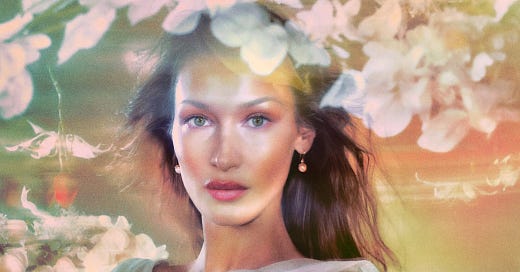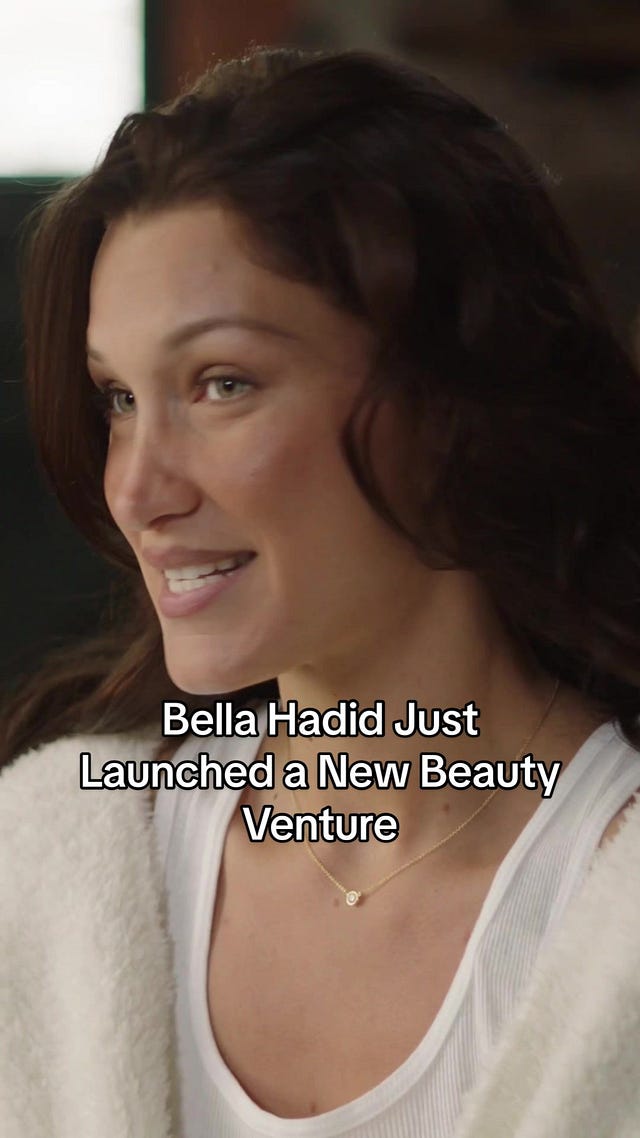Would You Buy Bella Hadid’s Fragrance if It Didn’t Pretend To Be Good for You?
Probably not because we can't afford to be unwell.
All week I was trying to think of something to say about the Bella Hadid fragrance drop. If you didn’t hear already, Bella Hadid launched a trio of perfumes as the first product in her ‘Ôrəbella beauty-wellness line (the stylization of that name will be the death of me so I’m going to forgo it from now on).
But I don’t have much to say about the Bella Hadid Orebella perfumes because I feel like I’ve said it a million times before. Celebrity fragrances are back, albeit with new strategies like higher price points and more comprehensive branding, as I’ve previously reported. “Wellness” perfumes are also growing more and more commonplace, as I’ve already written about. Bella’s Orebella throws a few more buzzwords in there by calling itself “the first intentional skin parfum” (which…what?). I’m assuming that word salad is essentially saying it’s a continuation of the “skinification of X” beauty category trend, which I also covered back when the buzzword creeped into the hair care market.1
As far as originality you goes, you do have to shake Bella’s perfumes to “activate” them, so there’s that.
 Tiktok failed to load.
Tiktok failed to load.Enable 3rd party cookies or use another browser
Anyway, tl;dr Bella Hadid makes fragrances now and they’re promoted as alcohol free, skin nourishing, and mood and aura and energy enhancing. Blah blah blah. I think perhaps what is most tiresome to me about this launch is not just the fact that Addison Rae already did this, it’s this idea that everything we consume now needs to be “good” for us. And good can mean a lot of things — it’s good for our health, or the environment, or our social values, therefore it’s justifiable to spend money on (the Orebella website has a whole page of its various clean and social good credentials, like the fact that 1 percent of net sales go to charity — which I hope does something truly meaningful, and maybe it does!). Every commercial product needs to fulfill some moral highground or aspire to cure some vague malady, or at least appear to without anyone really having the ability to vet those claims.
Which makes shopping feel like a sort of paradoxically moralistic exercise. It’s like an attempt to soothe our conscious over the evils of consumer culture, rather than own up to the fact that there is no ethical consumption under capitalism. Acknolwedging that fact could either make you throw your hands up and say fuck it, I will give all my money to further line the pockets of LVMH or Coty in exchange for a nice perfume, or it could make you stop buying perfume altogether. Either way probably a risky marketing strategy.
But this reliance on wellness at every turn strikes me as a very American ideal; we can’t just enjoy something because it feels good without some vein of puritanical morality. You can’t just enjoy a simple indulgence for the sake of an indulgence; it needs to do something vaguely “good” for us along the way. Years ago I got a random press release about a new wellness-timged alcohol line that billed itself as a “conscious cocktail brand.” I can’t even recall what the name was and who knows if it’s still around, but the email tagline did make me laugh: both for conjuring up the image of a sentient cocktail and for implying that alcohol can be a health beverage, which it most certainly is not. When being treated for testicular cancer, the Irish author Colm Tóibín wrote that his nurses told him heavy drinkers fare better with chemotherapy because they’re used to pumping poison into their body on a regular basis.
Gen Z, in addition not fucking, is also not drinking a lot these day compared to prior generations, which is probably wise in a lot ways. And also stirring a crisis in the alcohol industry, hence the pivot to wellness. But also, man, we’re all living in horrific times and we don’t even allow ourselves to enjoy some body-destroying hedonism along the way, as Gary Shteyngart bemoaned in his fabulous essay on martinis for The New Yorker:
“Modern Americans are supposed to submit to all the indignities of late capitalism: the endless work hours, the 9 p.m. e-mails from our superiors, software that monitors our every keystroke. And then we’re not even supposed to have a drink in the middle of this psychic carnage? (Perhaps that drink would interfere with our productivity.)”
Bella is certainly aware of this desire for optimized wellness at all turns as she already has a wellness non-alcoholic beverage brand, Kin Euphorics, under her belt. And that said, in times of stagnant wages and constantly layoffs, if you have two nearly identical products (as a lot of perfume and beverages are) but one claims to have an added benefit, why wouldn’t you go for that added benefit, even if it only vaguely promises some mumbo-jumbo adaptogen skin nourishment? May as well try and get as much of your money’s worth as possible. If you believe it hard enough, it will work.
But I guess the other side of this marketing approach that perturbs me is that, in my eyes anyway, it shows a lack of confidence in your perfume as an olfactory experience. Or at least as a stylistic fantasy. The difference with Ourebella from many other perfume brands is Bella herself — she’s a genuine style icon who has the modeling chops to supersede her nepo baby status. People want to emulate her. And sure I guess emulating Bella these days does mean hoping you’ll spritz some perfume on and have her perfect, glowing skin. It just seems sort of boring. There’s no indulgence.
As far the smell goes, for the fragheads it’s worth adding that the Orebella perfumes are made by Jérôme Epinette, celebrity perfume nose de jour as the man behind Harry Styles’ and Victoria Beckham’s launches, and Clement Gavarry, the nose behind perhaps the most impactful celebrity perfume of the past decade, Ariana Grande Cloud.
But does anyone even care how they smell? I mean I am here talking about it, having not smelled them, because they’ve provided some concrete points that can be communicated through a screen. And if you’re buying your perfume online, as many of us are these days, does anything else even matter?
Ok I actually do have one new, business-y thought on this. Which is that Ulta is snagging all the cool celebrity perfume launches — they got the exclusive on Billie Eilish, Ariana Grande, Kylie Jenner, and Millie Bobby Brown’s perfumes (though not sure how many people really care about the latter two — if you’re into them please report back). And they will be getting the Orebella fragrances later this month as the sole retailer outside the brand’s website, as far as I can see. I wonder if Sephora, which has seemingly missed all the new wave celebrity perfumes and instead cornered the pseudo indie-niche perfume market, cares at all.





